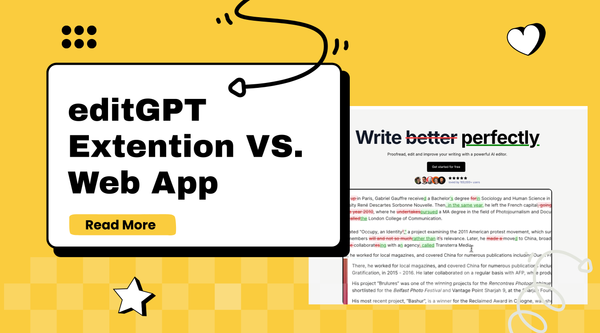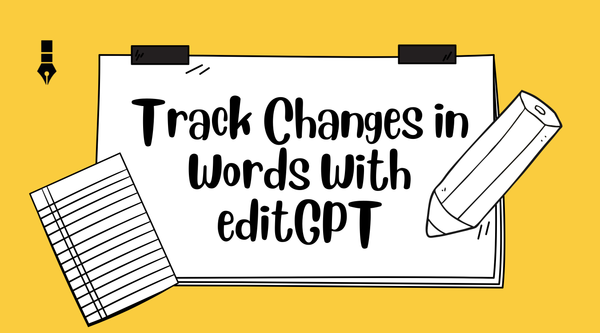Best AI Editor Showdown: EditGPT vs WhiteSmoke – Which Saves You More Time?
Comparing WhiteSmoke vs editGPT to find the best AI editor. See which tool saves more time, preserves your voice, and delivers real value.

The frustration is real.
Sitting there, watching the cursor blink while your grammar checker takes forever to load. Minutes tick by. Deadlines get closer. And you're stuck waiting for what should be a simple fix.
I've been there too many times to count.
After testing dozens of writing tools and the best AI editor over the years, I've learned that the real question goes beyond "Does it catch errors?" It's "Does it actually save me time?"
That's where editGPT and WhiteSmoke come in.
Both tools promise to be among the best ai editors today and can speed up your editing process, but after testing them out, I discovered some pretty significant differences. WhiteSmoke markets itself as a budget-friendly alternative. Cheaper than Grammarly, which sounds appealing. But when I dug deeper, the value offer became more complex.
The editGPT Chrome extension shook me right from the start. It offers 10,000 monthly words completely free, with multi-language detection thrown in. Not bad for a free tool. But here's where it gets interesting: their Pro plan runs $12 monthly for 300,000 words, plus batch editing and long-form support.
The real difference?
WhiteSmoke focuses on technical fixes like catching grammar slips and spelling errors. editGPT acts more like that editor friend who understands what you're actually trying to say.
After weeks of testing both tools on everything from quick emails to lengthy manuscripts, I found myself consistently reaching for one over the other.
Look, WhiteSmoke handles the basics just fine. It'll catch your spelling and grammar mistakes. But editGPT is like having a partner who understands your style. It smooths out clunky phrasing and suggests stronger alternatives without ever stripping away your personality.
After using both for a few weeks, on everything from quick emails to full-length drafts, I noticed I was always reaching for one tool way more than the other.
This is not just about which tool catches more mistakes. It's about which one genuinely saves you time while respecting the voice that makes your writing uniquely yours.
Let's see how they actually perform.
In the Race for the Best AI Editor, Which Tool Saves More Time in the Real World?
After running both tools on editing tasks, the differences became impossible to ignore.
One tool consistently saved me hours. The other... didn't.
Quick Edits: editGPT's real-time suggestions vs WhiteSmoke's easy fixes
In my daily writing, I noticed something right away.
editGPT doesn’t just point out mistakes. It actually improves the text while still sounding like me. I like that it gives you options: light, standard, or deep edits like improve or rewrite, so you decide how much it changes. For quick emails, light mode is perfect. But when I’m working on a longer report, deep mode adds the level of polish I want.
WhiteSmoke takes a different approach. It catches grammar slips and spelling errors, but that's where it stops. The suggestions feel robotic, like it's following a checklist without understanding what you're actually trying to say.
The real test came when I was editing an emotionally charged piece about workplace burnout. WhiteSmoke kept suggesting changes that drained all the feeling from my writing. "This sentence is too informal" became its favorite complaint. editGPT? It preserved the emotional impact while cleaning up the technical issues.
The difference that matters most?
When editGPT encounters unclear phrasing, it offers multiple rewrite options. WhiteSmoke gives you one "correct" version that sometimes misses your intended meaning entirely.
Long-form Content: editGPT's batch mode vs WhiteSmoke's character limit
This is where WhiteSmoke's limitations become obvious.
editGPT's Project Mode handles full manuscripts without breaking a sweat. I used it to edit a 15,000-word white paper, and the tool maintained consistent tone and terminology from the introduction through the conclusion. You can organize chapters into sections, making large projects manageable instead of overwhelming.
WhiteSmoke has a 10,000 character limit. Not words but characters. That's roughly 1,500-2,000 words, depending on your writing style.
Imagine trying to edit a book proposal in 1,500-word chunks.
I tested this with a 5,000-word blog post. WhiteSmoke wanted me to break it into three separate editing sessions, copying and pasting sections back and forth. By the third session, the tool was making suggestions that contradicted its earlier edits.
editGPT handled the entire piece in one go. The last paragraph received the same attention as the first.
Learning Curve: Intuitive UI vs outdated interface
Time saved is also about how quickly you can quickly start using the tool.
WhiteSmoke's interface looks like it hasn't been updated since 2015. Finding basic functions requires clicking through multiple menus. The first time I used it, I spent ten minutes just figuring out how to change the editing settings.
editGPT's Chrome extension? I was editing productively within two minutes of installing it.
The interface is clean and distraction-free. Everything you need is right there. No hunting through confusing menus or outdated design elements.
It just works.
After testing both tools across these three critical areas, the choice became clear. editGPT consistently delivered time savings where it actually matters: in your daily writing workflow.
How They Fit Into Your Workflow
The best writing tool means nothing if it doesn't play nicely with how you actually work. After weeks of integrating both editGPT and WhiteSmoke into my daily routine, the differences became pretty obvious.
editGPT Chrome Extension and Google Docs Integration
The editGPT Chrome extension quickly became part of my regular workflow. What caught my attention first was how it works directly on the ChatGPT website. No switching between tabs or copying text back and forth. When ChatGPT generates a response, the editGPT button just appears, ready to polish whatever needs fixing.
But that's not all.
Document formatting stays intact. Bold text, italics, bullet points, everything carries over. Even better, I can import Word documents and export them with all the track changes preserved.
The track changes work exactly like you'd expect. Highlight the text, hit Accept or Reject. Simple. Clean. No learning curve required.
WhiteSmoke's compatibility with browsers
WhiteSmoke covers the basics including Chrome, Safari, Edge, Firefox, Opera. It integrates with Microsoft Office and Gmail, which sounds convenient enough on paper.
The reality? Not so smooth.
WhiteSmoke only works online. Period. Try using it on a flight or in a coffee shop with spotty wifi, and you're stuck. There's no mobile app either, so those quick edits you want to make on your phone? Forget about it.
They claim it works "everywhere you type", but my experience tells a different story. Too many gaps, too many limitations.
Switching between tools: Which one disrupts less?
After using both tools for several weeks, the workflow disruption became crystal clear. editGPT just feels more streamlined. The interface is clean enough that even my nephew figured it out without asking questions. Less stress, more actual editing.
WhiteSmoke's interface feels clunky by comparison. The constant need for internet connection meant I was always checking if I was online. No mobile support meant switching devices for simple tasks.
What sealed the deal for me?
editGPT works directly inside my existing tools. Instead of copying text between applications, I just turn on editGPT while writing in Word. It scans and corrects in real-time. Those minutes saved throughout the day they add up real fast.
Who Should Use What?
Depending on your needs, they determine which tool will actually save you time. Check out where you best fit below:
Students: Academic mode vs grammar reports
If you're working on research papers, editGPT might be your best option. Unlike WhiteSmoke's basic grammar reports, editGPT is specifically designed for formal academic writing.
What struck me during testing was how editGPT kept a scholarly tone without killing my arguments. That's crucial when professors want both technical correctness and original thinking.
WhiteSmoke is fine if you’re just working on quick assignments or shorter papers. But it doesn’t hold up when you need real depth for academic writing. And for anyone tackling longer projects, you won’t have to worry about those annoying character limits I mentioned earlier.
Copywriters: Tone control vs sentence simplification
Writing marketing copy? This is where editGPT really shines. It catches errors without watering down the personality in your copy. What impressed me most was how the editGPT extension preserved those persuasive elements I'd intentionally crafted.
WhiteSmoke does offer Natural Language Processing for style suggestions, but during my testing, these felt... generic. editGPT adapts to your specific writing style and offers contextual rewrites that maintain the punch good copy needs.
And punch is what sells.
Business Owners: Industry-specific prompts vs templates
Juggling multiple business writing tasks? editGPT's industry-specific custom prompts are invaluable. When I tested both tools on business correspondence, the editGPT app immediately recognized appropriate business language patterns.
The edits felt human.
editGPT also has a dedicated business mode that understands business communication. This proves especially useful for quick-turnaround content like emails and proposals, where WhiteSmoke's template-based approach sometimes felt... well, outdated.
Authors: Creative flow vs structural analysis
For fiction and non-fiction authors, this is the big one.
Preserving voice while improving readability is everything. The editGPT AI understands rhythm and flow in creative storytelling, offering suggestions without disrupting style. During my novel-editing process, I found this sensitivity to creative expression invaluable.
WhiteSmoke's structural analysis? It focuses too much on technical correctness at the expense of emotional resonance.
When I was editing emotionally charged scenes, editGPT preserved the feeling I wanted to convey. WhiteSmoke's suggestions often flattened the impact of my most powerful passages.
That's the difference between editing and understanding.
Customization and Personalization
Here's what separates a decent writing tool from one that actually becomes part of your daily workflow: Does it work the way you work, or do you have to change everything to fit the tool?
Prompt-based editing in editGPT
The thing I like about editGPT is that it doesn’t box you in with stiff templates. You can just tell it what you need. Want something formal and academic? Say it. Prefer a casual, to-the-point style? Ask for that instead.
What really stood out to me is how well it handles simple instructions. You don’t need to fiddle with settings or learn some complicated workflow. Just type things like “fix grammar,” “cut the repetition,” or “make this clearer,” and it does exactly that.
What truly sets it apart are its specialized prompts. editGPT offers dedicated tools for complex documentation like technical proposals, legal briefs, medical writing, and other areas where most competitors, including WhiteSmoke, simply don't compete. When I tested this on a legal brief, the difference was immediately obvious.
Style retention and tone matching
This is where my biggest concern always lies. Will the tool butcher my voice?
editGPT respects your original tone without flattening your personality . After running dozens of pieces through it, I can confidently say it enhanced my writing without making it sound robotic.
The tone adjustment capabilities are remarkable. You can easily shift content to be:
- Academic: Perfect for formal research papers
- Formal: Ideal for business communications
- Casual: Suitable for blog posts and social media
- Speech-oriented: Optimized for spoken delivery
WhiteSmoke does analyze writing style using Natural Language Processing , but it feels mechanical compared to editGPT's contextual understanding.
The real test?
I ran the same creative piece through both tools. editGPT preserved the emotional impact I was aiming for. WhiteSmoke suggested changes that would have completely killed the mood I'd worked so hard to create.
Template support and formatting tools
editGPT maintains formatting, supports bold, italic, and other styling options . It even preserves formatting when importing and exporting Word documents , making transitions seamless.
WhiteSmoke offers over 100 templates for business, legal, and medical writing . Sounds impressive, right? But these templates feel dated compared to editGPT's dynamic approach.
Here's the difference:
While WhiteSmoke gives you static templates, editGPT's formatting support adapts to your existing documents. Its personal dictionary feature ensures accurate suggestions for industry-specific terminology. It's something I consistently found missing in WhiteSmoke's approach.
It just works better with how you already write.
Support, Updates, and Community
Here's something most reviews won't tell you.
The fancy features matter, sure. But when you're stuck at 11 PM trying to meet a deadline and your editing tool breaks down, support becomes everything.
I learned this the hard way with both tools.
Customer Support: 24/7 chat vs limited service
The editGPT app surprised me with its AI-powered support that actually works around the clock. And I mean actually works. When I hit a formatting issue while editing a client proposal on a Sunday night, I got helpful responses within minutes.
WhiteSmoke? Different story entirely.
They offer phone support, but only if you're on their business plan. For everyone else, you're pretty much on your own. During my weekend testing sessions, this became a real problem when I needed quick help but couldn't find it anywhere.
The difference became clear pretty quickly.
editGPT's support felt like having a knowledgeable colleague available whenever I needed help. WhiteSmoke's approach felt more like... well, like calling customer service at a traditional software company.
Feature Updates: Weekly rollouts vs legacy system
This might be the most telling difference between these tools.
editGPT updates constantly. I'd see new features pop up almost weekly during my testing period. The developers actually hang out on Reddit, responding to user feedback and fixing compatibility issues with new ChatGPT updates.
It's refreshing to see a company that actually listens.
WhiteSmoke feels stuck in the past. Their interface looks the same as it did months ago, and new features arrive at a glacial pace. While competitors are rolling out improvements, WhiteSmoke users are still waiting for basic upgrades that should have happened years ago.
User Community and Tutorials
WhiteSmoke does provide decent video tutorials covering grammar basics. If you're new to writing and need to understand fundamental rules, you can add them up to your toolkit.
But this is where editGPT shines. Its Reddit communities are very active in sharing custom prompts and editing techniques regularly. I've discovered writing tricks there that I never would have found in any manual. The collaborative atmosphere makes the tool feel more like a community than just software.
When you're choosing a tool you'll use daily, the support ecosystem matters as much as the features themselves.
Here's how they stack up
After days of testing both tools, their strengths and limitations become clearer when you lay them out side by side.
editGPT vs WhiteSmoke: Feature Breakdown
The numbers tell part of the story, but they don't capture everything. WhiteSmoke's character limit alone made it frustrating for any serious writing work, while editGPT's Project Mode kept me focused on the actual writing instead of technical limitations.
The real difference shows up in daily use.
Final Thoughts
After weeks of testing, the choice became obvious.
editGPT consistently outperformed WhiteSmoke in almost every scenario that matters to writers who actually care about their time.
The time savings alone made the difference.
While WhiteSmoke kept me jumping through hoops dealing with character limits, clunky interfaces, and corrections that missed the point, editGPT just worked. Its real-time suggestions and seamless workflow integration saved me hours that WhiteSmoke's outdated approach simply couldn't match.
But here's what really sealed the deal: editGPT respected my voice.
When I edited creative pieces or marketing copy, WhiteSmoke would flatten the personality right out of my writing. editGPT? It enhanced what I was trying to say without erasing what made it mine.
The numbers don't lie either.
editGPT's free tier gives you 10,000 monthly words, and the Pro plan delivers 300,000 words for $12 monthly. WhiteSmoke might sound cheaper at first, but when you hit those character limits every few paragraphs, the value disappears fast.
Then there's the support and updates.
editGPT improved weekly during my testing. WhiteSmoke barely changed. That tells you everything about which company prioritizes user experience over just collecting subscription fees.
So who wins?
For students, copywriters, business owners, and authors, those who pretty much anyone who writes regularly, editGPT delivers what it promises. Better editing, faster workflow, and your voice stays intact.
WhiteSmoke will catch grammar mistakes. But if you're looking for a tool that actually saves time while making your writing better, editGPT is the clear winner.
It's not even close.
Key Takeaways
After spending a good amount of time with both editGPT and WhiteSmoke, a few things became crystal clear. Here’s the real scoop to help you decide which one is for you:
- editGPT just saves you time, plain and simple. Its suggestions pop up as you write, it can handle documents of any length, and the interface just makes sense. WhiteSmoke, on the other hand, feels a bit clunky with its character limits and outdated design.
- editGPT actually sounds like me when it's done. It fixes my mistakes without stripping away my personality. WhiteSmoke tends to make everything sound a little robotic in its quest for perfect grammar.
- When you look at the price, it's a no-brainer. For $12 a month, editGPT gives you a massive 300,000-word capacity and all its advanced features. WhiteSmoke's tiny 10,000-character limit feels incredibly restrictive for anyone who writes regularly.
- And you’ll actually use editGPT because it works everywhere—right in your browser with a Chrome extension or on your phone. WhiteSmoke is pretty much stuck on your desktop, which just isn't how most of us work anymore.
- So who's it for? If you're a student, writer, or anyone who cares about your unique tone, editGPT is the obvious choice. WhiteSmoke might only be useful for someone who needs a very quick, basic grammar scan now and then.
- All in all, if you want a tool that truly saves you time, keeps your voice intact, and works like how a writing partner should, editGPT is the clear winner. It’s the one that actually delivers on its promises.
FAQs
Q1. How do editGPT and WhiteSmoke compare in terms of pricing and word limits?
EditGPT offers a free plan with 10,000 monthly words and a Pro plan at $12/month for 300,000 words. WhiteSmoke is cheaper than some premium alternatives but has a 10,000 character limit, which can be restrictive for longer documents.
Q2. Which tool is better for preserving the writer's unique voice?
EditGPT is designed to maintain the original tone and style of your writing while making improvements. WhiteSmoke tends to focus more on technical corrections, which can sometimes flatten the personality in your writing.
Q3. How do these tools integrate with different platforms and devices?
EditGPT offers a Chrome extension, Google Docs integration, and works directly on the ChatGPT website. It also has a mobile app. WhiteSmoke is compatible with various browsers and Microsoft Office but lacks a mobile app and only functions online.
Q4. What kind of customization options do these tools offer?
EditGPT provides custom prompts, industry-specific editing modes, and supports various writing styles (academic, formal, casual, speech-oriented). WhiteSmoke offers templates for different types of writing but has less dynamic customization options.
Q5. How frequently are these tools updated and what kind of support is available?
EditGPT receives weekly updates and offers 24/7 AI-powered chat support. WhiteSmoke has less frequent updates and provides more limited support options, with phone support available only for business plan subscribers.
Want to explore other grammarly alternatives? Check out this blog: 1o Best Grammarly alternatives for Writers in 2025/2026
Recommended Reading
- Video review: This AI Text Editing Tool Is FLAWLESS!
- Best AI Proofreader Tools of 2025 (Tested for Accuracy, Speed & Tone)
- editGPT vs Grammarly vs Quillbot: Which Writing Tool is Best?
- The Best AI Proofreaders That Actually Work (Free & Paid)
- Try editGPT
- Review: Wordtune Editor vs editGPT
- Review: Grammarly vs editGPT
- Review: ProWritingAid vs editGPT
- Review: Hemingway Editor vs editGPT
- Review: 10 Best Grammarly Alternatives for Writers in 2025/2026
- Review: editGPT vs Trinka AI: Which is the best Grammarly alternative?
- Best AI Tools for College Essay Editing in 2025
- What is the best AI Proofreader?
- Best AI Proofreader Tools of 2025 (Tested for Accuracy, Speed & Tone)



